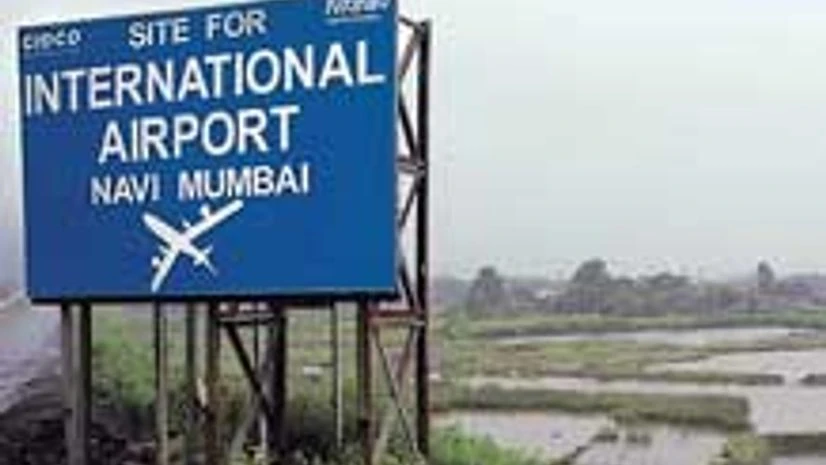The Maharashtra government on Wednesday told prospective bidders for the Navi Mumbai international airport project to submit their proposals by June 18.
The project, which will come up on 1,160 hectares of land, will be built in four phases. The first phase with an annual capacity of 10 million passengers will be completed by 2018. After the completion of the whole project, it will cater to about 60 million passengers a year.
The airport will be developed through public-private partnership on design, build, finance, operate and transfer (DBFOT) basis.
The City and Industrial Development Corporation (CIDCO), which issued the request for qualification (RFQ), said it hoped to acquire the balance 247 hectares required for the project by June this year.
Despite getting environmental clearance from the Centre almost three years ago, the project was stuck due to protracted negotiations with farmers who wanted a compensation package of Rs 20 crore per hectare or 35 per cent of the land bank as a developed plot.
CIDCO’s Vice-Chairman Sanjay Bhatia clarified the compensation for project-affected persons would not be in cash and they would be provided land. Of the 2,268 hectares required for the airport project, 1,572 hectares is already in CIDCO's possession.
The first two phases of the project will cost Rs 9,500 crore. Pre-development works to be carried out by CIDCO will cost around Rs 2,358 crore. All costs for pre-development work such as site preparation, shifting of transmission towers, rehabilitation of affected persons, etc. will be treated as an interest-free loan from CIDCO to the concessionaire.
The soft loan amount will be used for partial subscription of CIDCO’s 26 per cent stake in the project.
Bidders will be selected on the basis of premium (percentage of gross revenue), which will be offered to CIDCO. The concession period will be indicated in one of the bid documents.
The Navi Mumbai airport was conceived because the Mumbai international airport, managed by the GVK group, is expected to reach its peak capacity of 40 million passengers a year within a year of the start of its operations.
The Hyderabad-based GVK group’s Mumbai International Airport Limited (MIAL) has the first right of refusal for developing the Navi Mumbai airport as it would come up within 150 km of the Sahar airport. If GVK’s bid falls short of the highest bid by 10 per cent or less, it will have the right to revise its offer to match the top bid and operate the airport.
However, the Tata group may not be able to participate in the bid process because of a clause that restricts an airline or its associate company from holding more than 10 per cent stake in the special purpose vehicle executing the project.
Tata group has 51 per cent stake in Tata-Singapore Airlines and holds 30 per cent stake in AirAsia India. Tata Realty and Infrastructure Limited (TRIL) was keen to participate in airport projects and had tied up with Singapore's Changi airport to develop and manage airports in India.
“We have not seen the RFQ document as yet. TRIL will consider bidding for the airport only after going through the bid documents in detail,” a company spokesperson said. The spokesperson added TRIL had not yet formed a consortium for Navi Mumbai project.
The GMR group, which operates the Delhi and Hyderabad airports, said it was evaluating the investment opportunity. GVK group and Reliance Infrastructure did not comment. Th Essel group too has shown interest in airport development projects in the country and has tied up with US-based ADC & HAS Airports Worldwide as its partner.
Amongst the foreign airport developers Zurich Airport which holds a minority stake in Bangalore Airport has expressed desire to participate in Navi Mumbai airport.
Phase I and II of the Navi Mumbai project will cost Rs 9,500 crore. Pre development works to be carried out by CIDCO will cost around Rs 2,358 crore. Pre development works will include site preparation, shifting of transmission towers, rehabilitation of affected persons etc. All costs incurred for pre development works will be treated as an interest free loan from CIDCO to concessionaire. The soft loan amount will be used for partial subscription of CIDCO's 26 percent stake in the project.
Bidders will be selected on the basis of premium (percentage of gross revenue) which will be offered to CIDCO. The concession period will be indicated in one of the bid documents.
More From This Section
Manish Agarwal, Leader Infrastructure, PwC India said ''The timing of launch of RFQ process is good as it avoids the code of conduct becoming a hurdle. The key test of readiness of the project would be the timing of the release of RFP, which still seems to be six months or more away.''
According to the RFQ, the eligible bidder should have experience from airport sector and core sectors such as ports, highways, express ways, railways (including. metro rail), power generation and real estate will be considered for evaluation. The bidder should also have experience in airport construction.
Bhatia said the project-affected persons (PAPs) in November last year agreed to Maharashtra government's offer of 22.5 per cent of developed land for every hectare of land acquired. The government has also agreed to offer one floor space index (FSI) for 12.5 per cent of developed land and 2.5 FSI for another 10 per cent. Further, the PAPs would get three times more land to the current residential plot they occupy.

)
